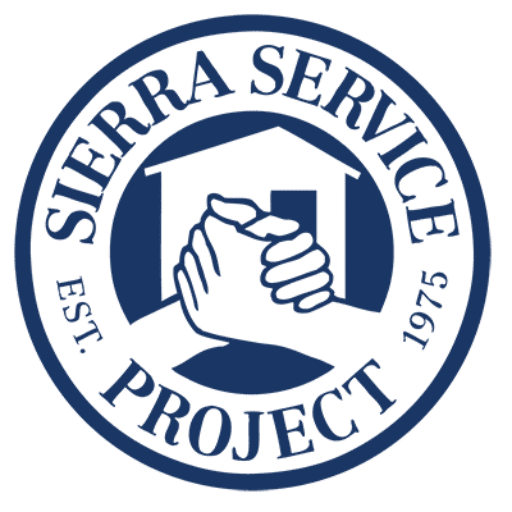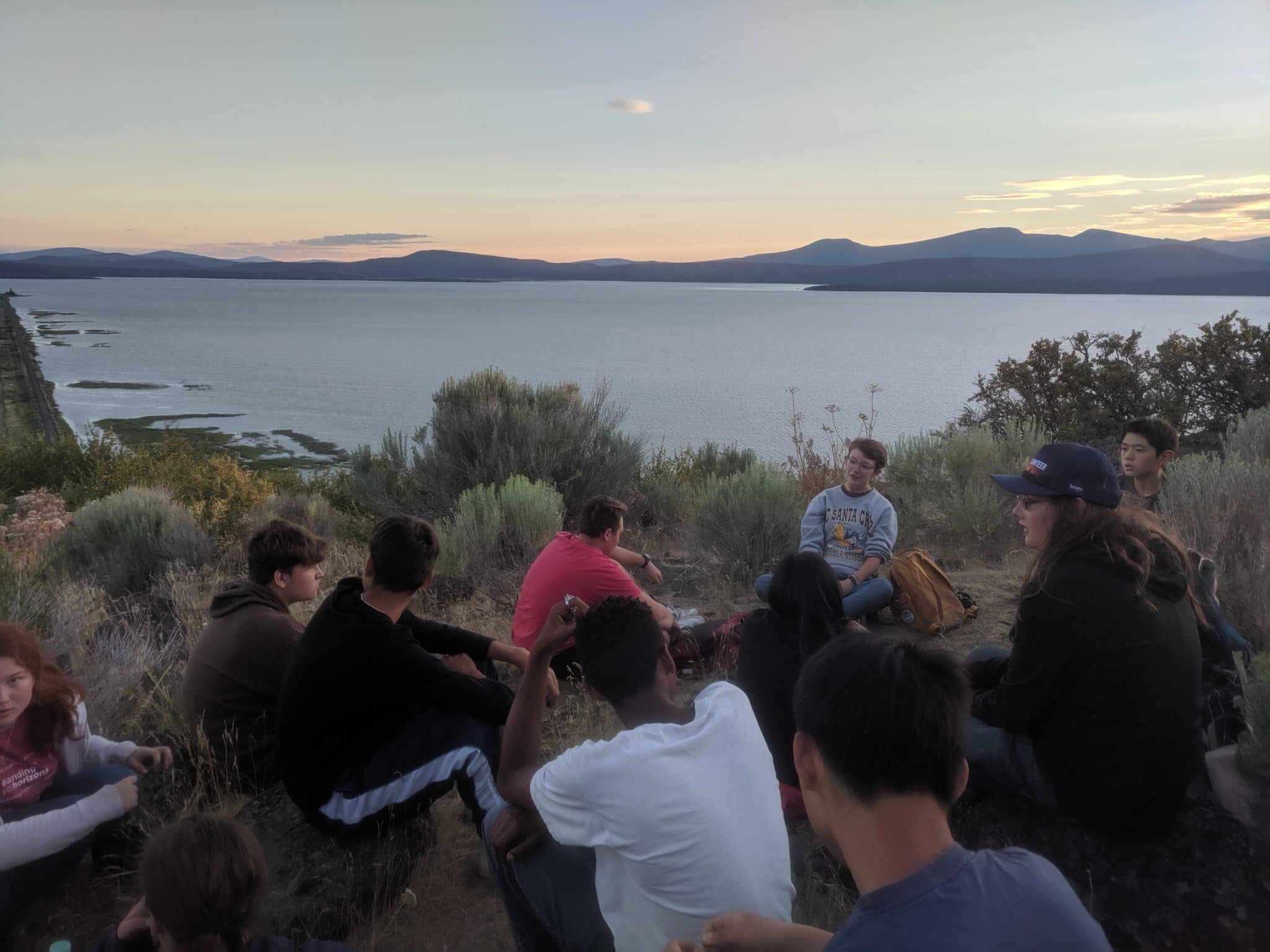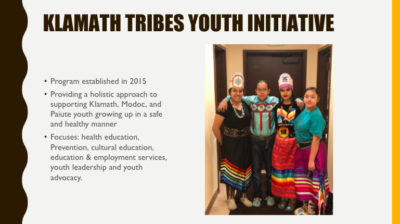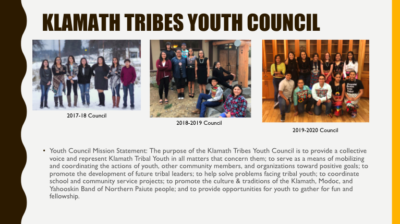By Chiloquin Staff
Caroline Hines (Site Director), Maggie Guekguezian (Spiritual Life Coordinator), Kelly Andrus, Eliza Haney, Jess Parker, and Will Wood
SSP has had a strong relationship with the Chiloquin community and local organizations for seven consecutive years, with a long history of partnership spanning the last two decades. We were thankful to partner with this community again this summer, albeit in a new online setting, and focus on the relationships we’ve cultivated over time.
This summer, our site relied both on staff members and a community speaker to provide quality Community Crossing sessions each morning for our participants. Will Hess, Lead Youth Initiative Coordinator of the Klamath Tribes, was our community speaker on Wednesdays. He shared about his own experience growing up in Chiloquin as well as the history of the Klamath tribes and their land. He is also an advisor for the Klamath Tribes Youth Council, which works to empower young leaders in the community and encourage healthy habits. The council is active on social media and holds regular events to engage youth in the community, especially throughout the pandemic. We began working with Will in the summer of 2019 when SSP and the Tribes hosted a collaborative youth kick-off event during preparation week.
Environmental Justice
We framed our staff-led content around Will’s presentation on tribal history and his work with youth in the community. Kelly Andrus’s presentation was about the land and preservation efforts in the Klamath Basin, so we scheduled it on Tuesday. This served as an introduction to the land the tribes are living on before Will came to speak with us. We also incorporated an activity after the presentation so participants could integrate their learning with environmental service. This activity utilized the materials from their SSP-in-a-Box which we sent each participating group before their week began. Participants could choose between planting seeds that were in their package, use the chalk to create some art inspired by nature, or go on a walk throughout their neighborhood or local area to pick up as much litter as they could.
Food Insecurity
Both Jess and Eliza’s presentations went hand in hand, encouraging and leading participants to imagine how they can effect change in their own communities. On Thursday, Jess talked about food deserts and how this relates to the Chiloquin community, and Eliza followed on Friday with how the youth can combat food insecurity in their own communities. Jess described how colonization has had an immeasurable impact on the environment and availability of first foods that the tribes historically relied upon. These foods included fish, berries, and acorns that could be found in the environment and provided an important cultural legacy that could be passed along between generations. Lack of transportation also decreases access to and availability of fresh, healthy food. Although there are grocery stores about 28 miles away in Klamath Falls, there is no public transportation which presents a big hurdle. Eliza led participants through how to plan a food drive to engage larger portions of their communities to help those in need, showing the kind of action they can take to serve when their week of SSP was over. These two presentations worked well after Will’s because the participants already had a solid understanding of the history of the tribes and why some folks may be food insecure today.
“Encouraging and leading participants to imagine how they can effect change in their own communities”
Our staff selected Community Crossing topics to cater to our individual strengths and interests. Because we were not focused on the job-specific tasks that would normally take up quite a bit of time during an in-person summer, we had more time to craft our own presentations. Our staff was able to harness our own experiences as students and young adults in advocacy to create a unique program. Jess is studying nutrition and sustainable agriculture at Cal Poly, which fit in perfectly with her presentation on the impact of food deserts in the Chiloquin area. Eliza’s presentation on service planning was backed up by her studies in education and working with youth. And, since Kelly is studying natural resources and forest ecosystems, she aimed to involve her passion for the environment into a presentation about the efforts to protect and preserve land in the Klamath Basin. These presentations really came from the heart as they involved our passions for SSP and the causes we hold dear.
“Our staff was able to harness our own experiences as students and young adults in advocacy to create a unique program.”
We wanted to make sure that Community Crossing sessions were engaging and dynamic so participants would enjoy what they were learning about Chiloquin. When planning the activities we included with our presentations, we reached out to Chiloquin contacts, including Patty Case with the Oregon State University extension center and folks at the Chiloquin Public Library, to ask what we could do for the community from afar. The extension hosts a summer lunch program, providing free meals to all Chiloquin youth ages 1-18. They asked us to write postcards or letters that would be distributed with meals each week and maintain a connection with youth in the community. In previous years, work teams have rotated assisting with games during the lunch program. Each Thursday after Jess gave the presentation on food deserts, we spent about half an hour writing and drawing words of encouragement to send to the lunch program coordinators so that they could include our notes with their meals!
“These presentations really came from the heart as they involved our passions for SSP and the causes we hold dear.”
Looking Forward
Friday’s theme, “Seed,” was designed to empower participants to utilize what they learned to bring about change in their communities; planting the “seeds” they found during their week with SSP. We wanted to empower youth for future activism so they could serve in their own communities, even if they couldn’t serve in-person in Chiloquin. Eliza’s presentation on service planning gave youth the tools they needed to make a difference that is feasible where they lived. She walked through how participants could create their own food drive to aid a food bank in their local area, and also provided ideas for other potential community service opportunities. A big advantage of meeting online was the opportunity to apply concepts we talked about to each individual’s home community.
“We wanted to empower youth for future activism so they could serve in their own communities, even if they couldn’t serve in-person in Chiloquin.”
We got a lot of feedback from participants who had been to SSP Chiloquin in the past that they learned more about Chiloquin in their online week than in their in-person week. We would love to incorporate what we learned this summer online into an in-person summer experience, infusing learning opportunities with hands-on service experience. To prepare for future service experiences with SSP in Chiloquin, our 2020 Community Crossing presentations are available to you to learn more and get excited:
- Kelly’s on environmental justice and preservation
- Will Hess’s on tribal history
- Jess’s on food insecurity
- Eliza’s on serving locally
We hope this year SSP can support our constituents by providing programs that foster fellowship and connection using the technology we have at hand. We can continue to build community during this pandemic by providing spaces for people who love the mission of SSP, and their friends and family, to spend (virtual) time together.
Editor’s Note: How would you like to be involved with SSP in the coming year? Complete our program interest survey by October 1 to let us know what kind of opportunities you’d like to see. Visit our Instagram and Facebook pages to watch our summer program videos and hear more about our community partnerships.



